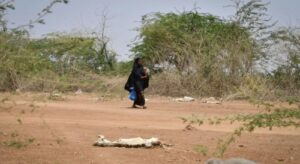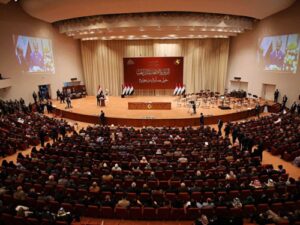
The National Interest Foundation Newsletter
Issue 159, September 8, 2022
Welcome to our NIF Newsletter. In this week’s headlines: new Israeli rules which would requireforeign passport holders to declare romantic relationships with Palestinians draw justifiable criticism, oil prices rise after Saudi Arabia and OPEC+ cut production as Biden’s visit to the Kingdom produced no real results, United Nations humanitarian officials warn that Somalia is on the brink of famine following the worst drought in four decades, and Iraq’s political impasse continues as the country’shighest court says that it cannot dissolve parliament.
Israel’s Restrictions on Love

Palestinian and Israeli rights groups alike have denounced the outrageous nature of such governmental regulations. (Photo from AFP)
New Israeli Rules Which Would RequireForeign Passport Holders to Declare Romantic Relationships with Palestinians Draw Justifiable Criticism
Newly proposed Israeli rules which would requireforeign passport holders to declare romantic relationships with Palestinians in the West Bank have elicited justifiable backlash. Human rights activists have criticized the controversial regulations as just the latest attempt to hamper and alienate Palestinian society, and as an abhorrent governmental prying into the private lives of citizens. Palestinian and Israeli peace advocacy organizations alike have condemned officials for trying to take restrictions to a new level. The rules have been cited as part of a wider crackdown by Israeli authorities against both foreigners and native Palestinians wanting to live, visit, work, or study in the illegally-occupied West Bank. The inclusion of new restrictions against Palestinian universities, such as a cap at 150 student visas and a limit of only 100 foreign lecturers, also supports the argument that these are blatant efforts to tamp down on the basic rights of Palestinians.
Israeli authorities have a track record of engaging in behavior aimed at repressing facets of Palestinian social fabric, including civil society, and as such the latest set of proposed restrictions came as no surprise. In fact, Palestinian civil society and human rights organizations are routinely subjected to crackdowns against their work to raise awareness regarding egregious Israeli violations. On numerous occasions, the Israeli Defense Ministry has sought to hinder and isolate these types of groups under the guise of labeling them as “terrorist entities” despite reputable Israeli counterparts drawing attention to the same abuses and discriminatory policies. In recent months, Israeli authorities have attempted to stifle Palestinian civil society groups like Addameer, Defense for Children Palestine, Al-Haq, the Union of Agricultural Work Committees, Bisan Center for Research and Development, and the Union of Palestinian Women Committees. The “terrorist entity” label is utilized in a clear effort to discredit their humanitarian work; even as more and more non-Palestinian organizations have begun to shed light on the array of Israeli human rights violations.
In addition to this, there are also the mere health work committees that have been separately targeted. Israel’s “terrorist” labeling outlawed these and certain rights organizations from operating and granted authorities the power to close offices, seize assets, and arrest staff members. Furthermore, the suppression prohibits the public from showing support or providing funding for these organizations, and citizens can face possible jail time if caught breaking these rules. Both prominent global groups Human Rights Watch and Amnesty International condemned the behavior, calling it an “appalling and unjust decision that attacks international human rights.” Ultimately, impartial analysts point to this as proof that Israeli authorities have sought to muzzle human rights groups and individuals who criticize their unjust practices against Palestinians.
Like the repression against civil and human rights organizations, the recent regulations on romantic relationships have been criticized as another attempt to isolate Palestinian society from the outside world, and vice versa. The restrictions would make it much more difficult for people to come work, volunteer, teach, invest, or study in Palestine. They are only proposed to be enforced relating to Palestinian residents and would not apply to those visiting Jewish-only settlements in the West Bank, highlighting their discriminatory nature and intent.
Oil Prices Rise After Saudi Arabia and OPEC+ Cut Production as Biden’s Visit to the Kingdom Produced No Real Results

In response to falling oil prices for the last few months, OPEC+ has determined to lower production despite American calls for the contrary in order to keep gas affordable. (Photo from The Guardian)
Oil Prices Rise After Saudi Arabia and OPEC+ Cut Production as Biden’s Visit to the Kingdom Produced No Real Results
Just last month, OPEC+, a coalition consisting of the Organization of the Petroleum Exporting Countries (OPEC) members in addition to other important oil-producing states, agreed to increase production of oil by 100,000 barrels a day in the month of September, creating the highest level of oil output by the organization since the onset of the pandemic. Earlier this week, however, OPEC+ essentially reversed their decision, cutting production by 100,000 barrels a day for the month of October. Although it is not completely inconsequential to the oil market, the 100,000-barrel cut is more of an indicator than it is a blow. With this decision, OPEC+ is making it clear that they intend to stabilize prices, as they have steadily dropped from the $116/barrel price that they were in June, for example. Furthermore, the group is signaling to other major buyers, including the United States, that they intend to keep prices high even as evidence of recession becomes increasingly more apparent, especially in Europe. U.S. President Biden has pleaded with OPEC+ for some time to increase production in order to keep gas prices lower for consumers, even going as far as to meet with Saudi Arabian leaders, as Saudi Arabia is the chair of OPEC+. Still, it seems that the president’s actions were in vain, being that Saudi Arabia spearheaded the production decrease. Part of President Biden’s determination to keep prices low may stem from fear that consumers will blame American sanctions against Russia in the war in Ukraine for higher prices.
In addition to the general lowering of prices that has taken place over the course of the summer, OPEC+ is also putting their foot down about pricing due to foresight into other aspects of the world scene. China has instituted strict COVID-19 polices once again, which have and will continue to greatly reduce demand from OPEC+’s largest importer. On top of that, the resumption of nuclear talks between Iran and the West has opened the door for increased oil supply and thus lower prices.
In response to the decrease in production – and more specifically, in response to what it may mean for the future – the price of Brent crude oil increased by slightly over 3% on Monday, but steadied and even fell on Tuesday. That being said, there are other risk factors at play that make high oil prices yet more likely going forward, one of those factors being Russia. Recently, the G7 countries put forward a plan to impose an oil price cap on Russia in an effort to cut off some of the funds they need to fight the war against Ukraine and simultaneously force Russia to sell oil at discounted prices to their countries’ consumers. However, many experts fear that China and India will not participate, allowing Russia to only sell to China and India (albeit at a lower price) and rendering the oil cap not only useless, but harmful to Western consumers as prices rise even higher. Sanctions placed on Russia by many of these same countries will also begin to have an impact at the end of this year, which may cause a similar problem.
What is to come is ultimately undecided, as there are factors at play that support the notion of both higher and lower prices in the future. But between seemingly inevitable economic decline and OPEC+’s firm stance on high prices, it seems very likely that consumers will be paying a pretty penny for the foreseeable future.
Warning Regarding Famine Risk in Somalia

The UN warns that the campaign to combat Somalia’s looming famine is severely underfunded, as the situation continues to take a backseat to other world issues. (Photo from UN)
United Nations Humanitarian Officials Warn That Somalia is on the Brink of Famine Following the Worst Drought in Four Decades
In a statement made on Tuesday, UN Under Secretary of Human Affairs Martin Griffiths painted a bleak picture for the future of Somalia, as yet another dry rainy season has been predicted between October and November. Although there can be considerable variation between regions, Somalia “normally” has four seasons, two dry and two wet. The first and longer wet season, called Gu, takes place from late March until June. The second, called Dayr, is much shorter and takes place in October and November. Starting with the Dayr season of 2020, all four rainy seasons that were supposed to take place since then have failed, with this fall’s rainy season predicted to come up short as well. These conditions have left Somalia in a state of crisis. An estimated 45% of the country’s population of 17 million is expected to be starving or worse in the coming months, with 730 kids having already died from malnourishment and another 213,000 people essentially on death’s door. When famine last struck Somalia in 2011-2012, more than 250,000 people died.
Arguably the most concerning part of the phenomenon is that these figures are persisting despite the best efforts of the United Nations. Since April, the UN has provided aid to 3.7 million people and anticipate reaching 4.5 million in the next few months. Still, it is far from enough. On top of the $1.4 billion that has already been requested from the UN, the Somali cause still requires approximately $1 billion more, according to experts. In theory, it is still possible to evade famine at this juncture, which can be declared when “data shows [that] more than a fifth of households have extreme food gaps, more than 30% of children are acutely malnourished, and over two people out of 10,000 are dying every day.” This was the case when Somalia again faced famine in 2016-2017, but generous donations from the international community held it at bay.
That will not be the case this year. International aid is down 70%, predominantly because many nations are instead pouring their finances into the war in Ukraine. What aid does make it to Somalia is impacted by the al-Shabab terrorist group, which dominates wide swathes of the country and does not allow aid to get to its intended destination. Additionally, the war in Ukraine is creating other dire circumstances for Somalia, which receives at least 90% of its wheat from either Ukraine or Russia. Because of the war, Ukraine has been forced to stop exporting grain almost altogether, while Russia’s capacity has been greatly reduced as well. However, Somalia is far from the only country to suffer from the lack of wheat. Together, Russia and Ukraine provide the world with over a quarter of its wheat, Russia providing 18% and Ukraine providing another 7%. Many countries in the Middle East, North Africa, and Southern Asia rely on them. For example, Egypt gets over 70% of its wheat from Ukraine or Russia. One can only hope that the war in Ukraine ends soon, as it may create emergencies in yet more countries. For the time being though, there is no denying that Somalia is suffering badly, if not worst of all, and unfortunately, there is little hope for improvement until the rainy season is supposed to hit in March of next year.
Iraq’s Top Court Won’t Dissolve Parliament

With their decision, Iraq’s highest court is putting the onus back on parliament to address the ongoing political impasse. (Photo from AP)
Iraq’s Political Impasse Continues as the Country’sHighest Court Says That It Cannot Dissolve Parliament
In one of the latest developments in Iraq this week, the country’s top court has rejected a petition to dissolve the parliament, extending the longstanding political stalemate. The court stated that they do not have the legal authority under the constitution to act in such a manner. Some analysts have argued that the decision is also meant to serve as a strong rebuke of the parliament’s behavior, effectively relaying to them that this is their mess to sort out and resolve. The petition to the court to intervene in the manner was put forth by populist leader Muqtada al-Sadr and his political bloc following more than 10 months of political paralysis and inability to form a government post-election. This impasse has created a major crisis, which has even boiled over in recent months into deadly violence between security forces and demonstrators.
In the elections held back in October of 2021, Al-Sadr and his allies came out as the biggest political bloc, winning 73 of the 329 seats in parliament. Although his bloc won the most votes, they have been unable to form a ruling government and recently their rival coalition submitted a list of lawmaker names and claimed to have more seats than Al-Sadr with a bloc of 88 members. The rival coalition, the Coordination Framework, has expressed that they are not opposed to early elections but are insistent on parliament to meet and vote on new electoral laws. Iraq’s federal court has also played a role in hindering the formation of the government, as it ruled that the legislature’s quorum for selecting a president is two-thirds of the members, meaning that if one-third of lawmakers fail to show, a president cannot be selected and the formation process is unable to ensue.
The parliamentary system of Iraq is an authority which possesses the power to choose the prime minister and president, and they also must approve any law before it passes. As it maintains such a stronghold of political power, it is stated that only the Iraqi parliament can dissolve itself if it is no longer serving the interests of the people. The Iraqi parliament is given a period of 30 days from its first session to elect the country’s new president, and it is then put to the largest bloc to form the government.
Al-Sadr supporters stormed the parliament back in late July in an attempt to prevent their rival coalition group from forming a new government. The ensuing rallies, sit-ins, counter rallies, and clashes with authorities have witnessed outbreaks of violence and further stalled the government-formation process. Last week, a deadly clash broke out as 30 people were killed in violence between Al-Sadr loyalists and security forces. The Judiciary in Iraq has urged the parliament to continue its constitutional duties by either forming the government or by dissolving itself. If parliament moves forward with a plan to dissolve itself and hold early elections, this could help to alleviate the longstanding political impasse. Both Al-Sadr backers and the Coordination Framework insist that the parliament be dissolved. To date, the calls for a new government have not materialized into concrete actions, and the recent court decision is the latest failed attempt to resolve the ongoing crisis.
